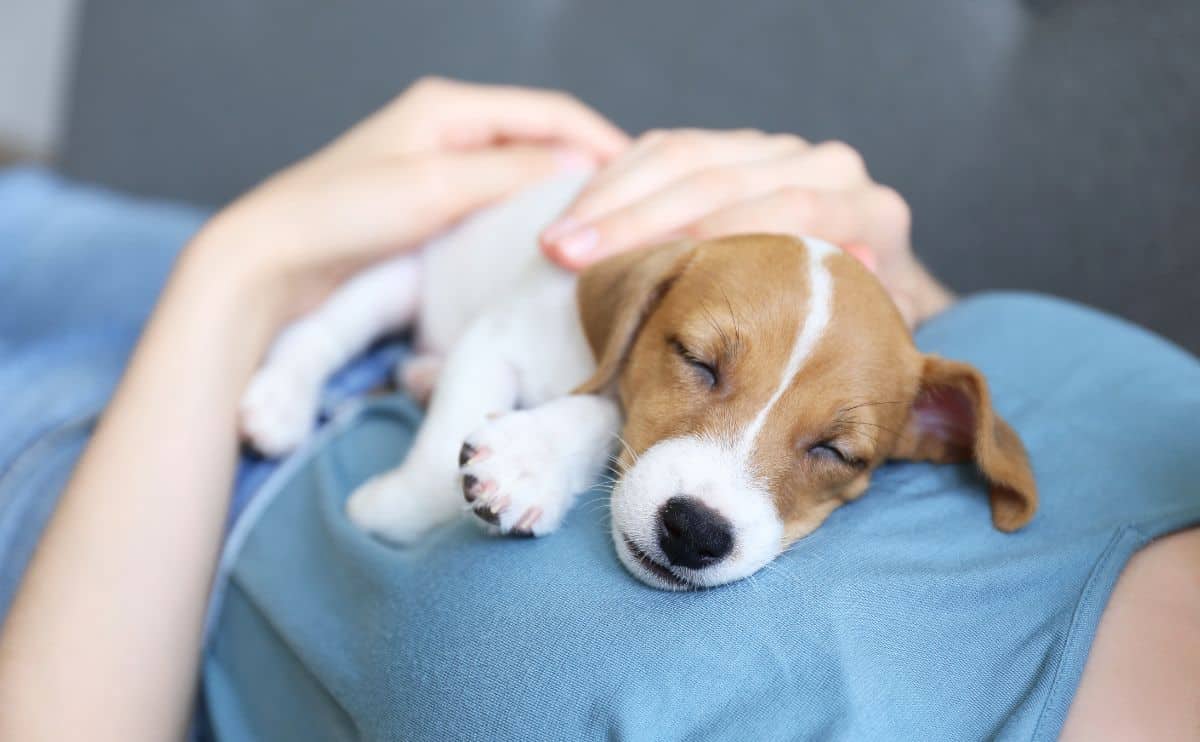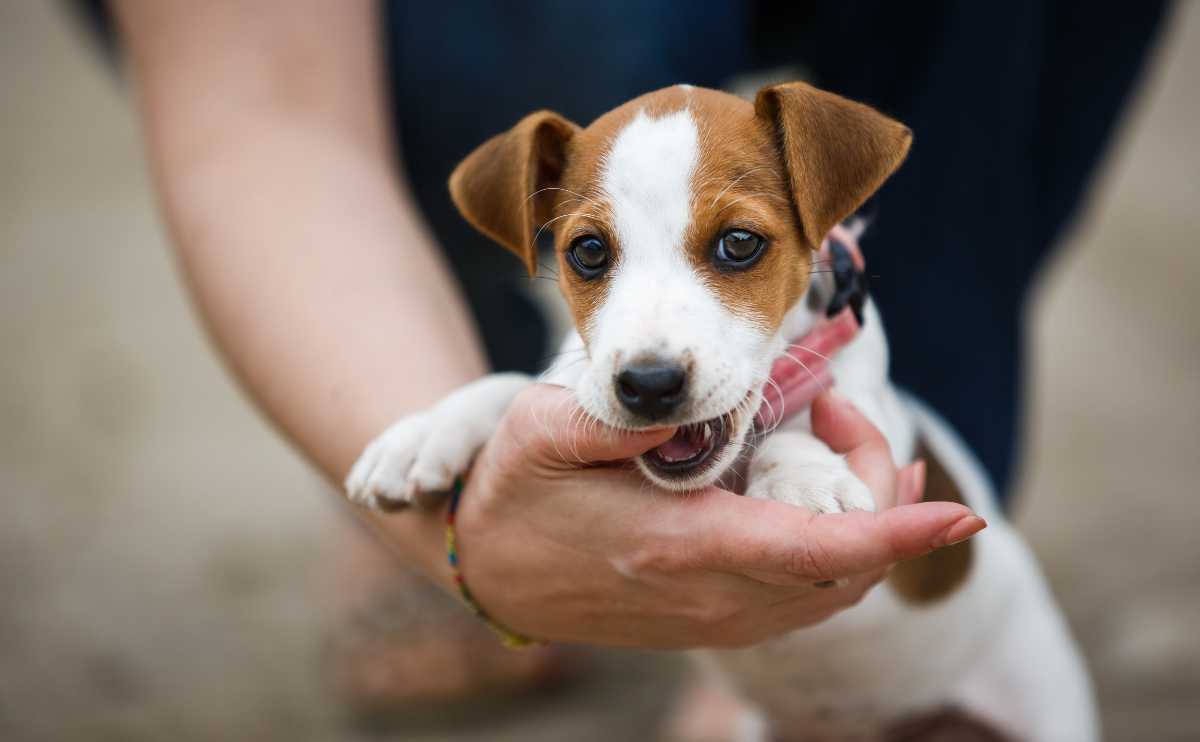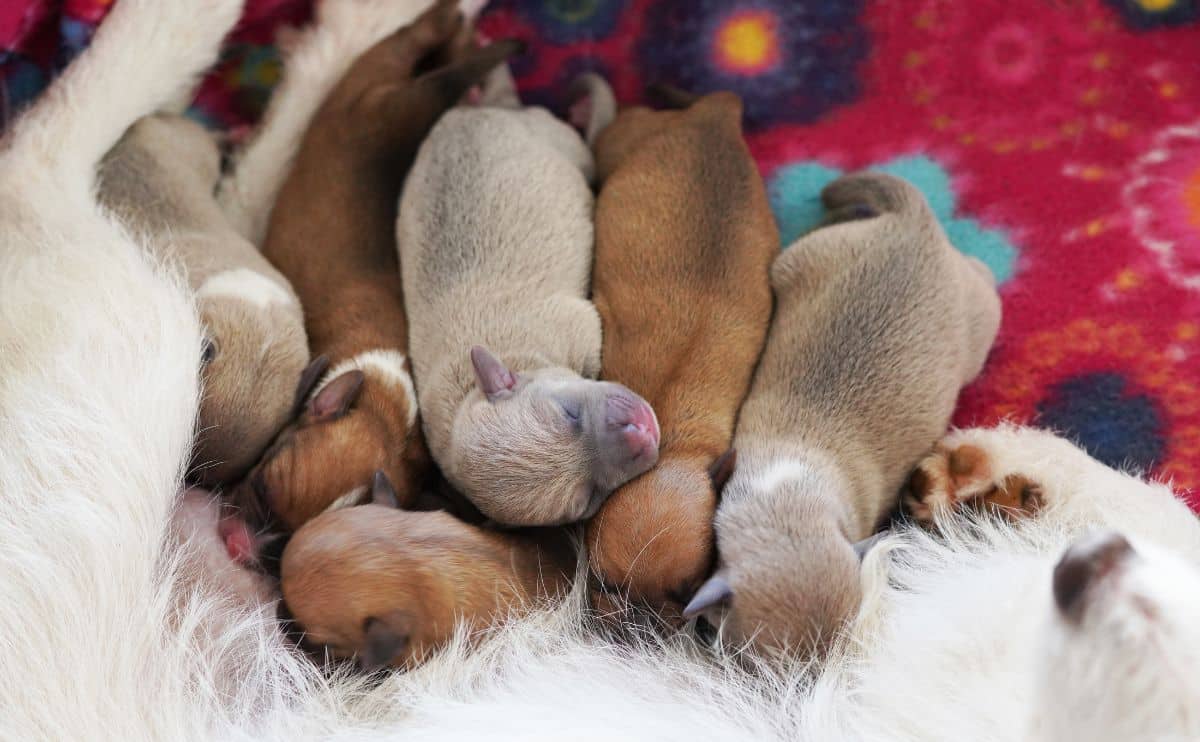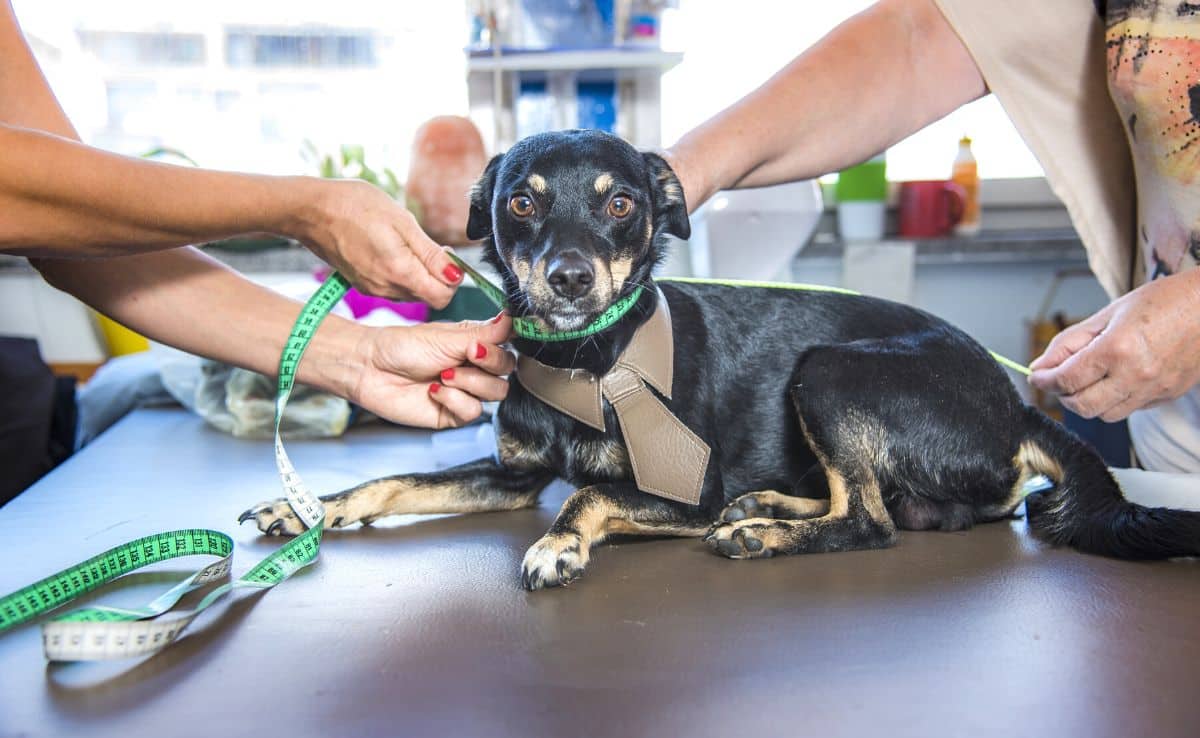When you purchase through links on our site, we may earn a commission. Here’s how it works.

Are you the proud new owner of an adorable puppy? If so, you likely have many questions about your puppy’s health and behavior. Many new puppy owners are concerned about their dog’s breathing, specifically when sleeping. Pet owners will sometimes notice puppies breathing faster when they are asleep. This can lead to anxiety and concern on the part of pet owners. Is a puppy breathing fast while sleeping normal? When is this a situation where owners should worry?
Is It Normal For Puppies To Breathe Fast While Sleeping?
In many cases, yes, breathing faster when sleeping is normal for puppies. However, this does not mean they should breathe rapidly or heavily the entire time they are sleeping. Along with that, sometimes rapid breaths can be an indicator of a more serious underlying medical condition.
Most of the time, rapid respiration during sleep that occurs only for a few minutes is normal and not something owners should be overly concerned about. However, there are a few things to look out for, especially if this happens every time your pup goes to sleep or lasts for more than a few minutes.
Why Is My Puppy Breathing Fast While Sleeping?
Puppies breathe at a higher respiratory rate, even at rest, than adult dogs. Puppies average between 15 and 40 breaths per minute compared to 10 to 30 breaths per minute for adults. Younger pups need faster and more breadth than adult dogs because they are growing. Their metabolism is much higher; therefore, they use more oxygen than larger, fully-grown dogs.
Owners must be sure their pups are asleep and then assess their breathing. They can breathe faster than normal for a few different reasons. Some are perfectly normal and have nothing to worry about, while others may warrant a call to the vet.
Safe Causes Of Puppy Breathing Fast While Asleep
Exertion
Most commonly, puppies breathe faster when sleeping if they have just had a physical exercise or play session. Their bodies will need to recoup the spent oxygen, and puppies will breathe more quickly until that oxygen is replenished in the blood. This type of fast inhalation and exhalation should typically subside within the first 15 minutes of your puppy falling asleep.
Dreaming
Your puppy may be breathing more rapidly because they are dreaming. Canines experience REM sleep and dreams just like humans. This can cause an increase in their heart and respiratory rate. Some pups may be very invested in an intense dream and can show other signs along with this increased respiratory rate. Some may make noises like whimpers, barks, crying, or tiny howls. Others may even move in their sleep, pantomiming, running, or playing.
Heat
Your pup could breathe faster while sleeping because they are hot. This can occur if it is warm outside, if they choose to slumber in a toasty spot of sun, or if they overextend themselves. A puppy can overheat quickly and develop heatstroke. Heatstroke is serious, so if you believe your pup is too hot, take some steps to cool them down. You can place them near a fan or window with a cool breeze. Turn off the heat and remove them from direct sunlight. Offer cool, fresh water. You may notice rapid breathing and panting, which is a natural method canines use to cool down.
Anxiety, Fear, Or Stress
Puppies can experience fear and anxiety for many reasons. When they experience something new, like a trip to the vet or even moving to a new home. When they feel these heightened emotions, the body releases more cortisol, causing the heart rate to increase. This stress response usually subsides reasonably quickly once pups have settled down and feel safe.
Unsafe Causes Of Puppy Breathing Fast While Asleep
Dehydration
Panting excessively, heavy, fast, and short breathing are signs of canine dehydration. Symptoms will also include a dry mouth, gums, and nose, lessened activity, slower responses, less mental focus, loss of balance, high heart rate, apprehensive behavior, sluggish appearance, sticky mucus membranes, decrease in urine output, and dark urine with a significant odor.
This is not an exhaustive list. Dehydration can also cause hypotension, hypovolemic shock, and altered consciousness. Dehydration is quite serious and must be treated quickly. Puppies are prone to dehydration because getting them to drink water and keep their moisture levels up is more challenging.
Injury Or Pain
Puppies can hurt themselves easily. After all, they are brand new, and there is much to learn in the world. Sometimes rapid, louder respiration can be caused by pain. Pain can be a result of an injury or an underlying medical condition. Often you may notice swelling, skin irritation, limping, or excess licking of a paw or limb. Inspect your pup for any signs of injury or tenderness. Call the vet to see if they want to do an exam, and if your dog is in a high level of pain, try to get seen as soon as you can.
Lung Disease
Unfortunately, a young puppy can be vulnerable to a host of respiratory issues. They have a developing immune system that is not yet as strong as an adult’s. This can leave them more susceptible to illnesses like kennel cough, influenza, bronchitis, pneumonia, respiratory infections, and more. Puppies will breathe faster as they have a harder time getting enough oxygen.
If your pup is sick, they will likely have other symptoms like nasal or eye discharge, drooling, lethargy, and low appetite. If you notice these symptoms accompanied by faster respiration, call your vet.
Heart Disease
Heart disease and defects can contribute to more rapid breaths. Congenital heart defects can cause faster respiration, as can congestive heart failure. These are very serious conditions and need treatment.
Anemia
A low red blood cell count is called anemia. Anemia is often caused by parasites. It can also be caused by the canine parvovirus, which is quite serious. Anemic pups may breathe faster as their bodies have to work harder to circulate oxygen. Pale blue gums, lethargy, and low temperature are also signs of anemia. This condition requires emergency treatment.
Dyspnea
This refers to heavy, labored breathing. It can be caused by fluid in the lungs and may be accompanied by fast respiration rates.
Diaphragmatic Hernia
A diaphragmatic hernia is a congenital defect. Due to improper development, the abdominal organs can push on the lungs, causing labored and rapid breathing. This will not just occur during slumber. Owners will notice other symptoms, like an irregular heartbeat, and this will require treatment. The only way to fix this is with surgery.
Is It Ok If My 8-Week-Old Puppy Is Breathing Fast While Sleeping?
Most likely, this is perfectly normal. Your pup is likely in REM sleeping and dreaming. Puppies have very active REM cycles, and this can cause them to breathe faster. They use up extra energy in the sleep stage, and the extra oxygen from rapid breaths in and out can help replenish this. This is less common in adult dogs.
If an 8- or 9-week-old puppy is breathing rapidly while asleep, and it does not stop after a few minutes, pups have blue or brick-red gums or are having trouble and working hard to breathe (tensed stomach), then this is not REM sleep. Contact your vet for an exam to rule out any underlying medical causes.
Puppy Breathing 100 Breaths Per Minute While Sleeping
A puppy breathing 100 breaths per minute while asleep is not normal. During exercise, dogs may breathe that rapidly, but during respite and sleep, that is too fast. This is a sign that lung or heart disease might be present or fluid buildup in the lungs. You will need to schedule an exam with the vet. They will likely perform several tests to determine what is causing this distinctively fast respiratory rate and then develop a treatment plan.
While you should not panic or assume the worst, a puppy with respiration this fast while asleep must be seen by a veterinarian sooner rather than later. Pay attention to this, and contact your vet as quickly as possible.
Puppy Panting While Sleeping
As with rapid respiration, puppies may pant and twitch when they sleep for several reasons. The sight of this can be very disconcerting and even scary for owners when it comes on suddenly. Most of the time, puppies panting while asleep is harmless and not a reason for owners to worry. However, there are some cases where there is an underlying health issue.
Puppies may start panting in their sleep because they are hot from physical activity or because the room temperature is high. Dogs pant to regulate their body temperature, which can happen while they sleep. In some cases, they may be panting as part of the growth process.
Panting and heavily labored breaths are signs of stress and anxiety. While this is often harmless and related to normal activity, puppies panting when asleep should never be ignored. Always observe your dog when this happens, and note how long and often it lasts.
In some cases, panting while asleep can be an indication of a worm infestation. Worm infestations can happen easily in puppies and are quite dangerous. They often inherit them from their mother in vitro or from nursing. Worms will prevent proper nutrition and development. A worm infestation can cause rapid breaths as well as panting due to swelling in the chest. Pups may have difficulty getting enough oxygen and will breathe short, quick breaths in an attempt to get enough oxygen. Worms will require an examination and treatment by the vet. Left untreated, these are very uncomfortable, causing weakness and sickness in your pup.
What Your Dog’s Breathing Can Tell You
Owners and veterinarians can learn a lot from their dog’s respiratory rates. A higher resting respiratory rate may indicate an underlying disease or the progression of an already-diagnosed condition. This is especially true in dogs that are suffering from lung or heart disease. Any kind of increase in their resting respiratory rate should be documented by owners and checked out by a veterinarian.
Interruptions in a dog’s normal breath pattern, abnormal noises, rasping, labored respiration, and excessively rapid panting or breath are all indicators that medical attention is necessary.
For most puppies, in most cases, fast respiration is normal, related to their activity, and subsides quickly. However, if you notice this rapid respiration going on for an extended period of time or other symptoms of sickness or illness, it is best to reach out to your veterinarian. Panting, drooling, and other physical behaviors are normal in most cases. However, there are underlying circumstances in which they are not. Learn more about what different sleeping positions mean and a little more about dog body language in our guide.
Tagged With: Sleep

